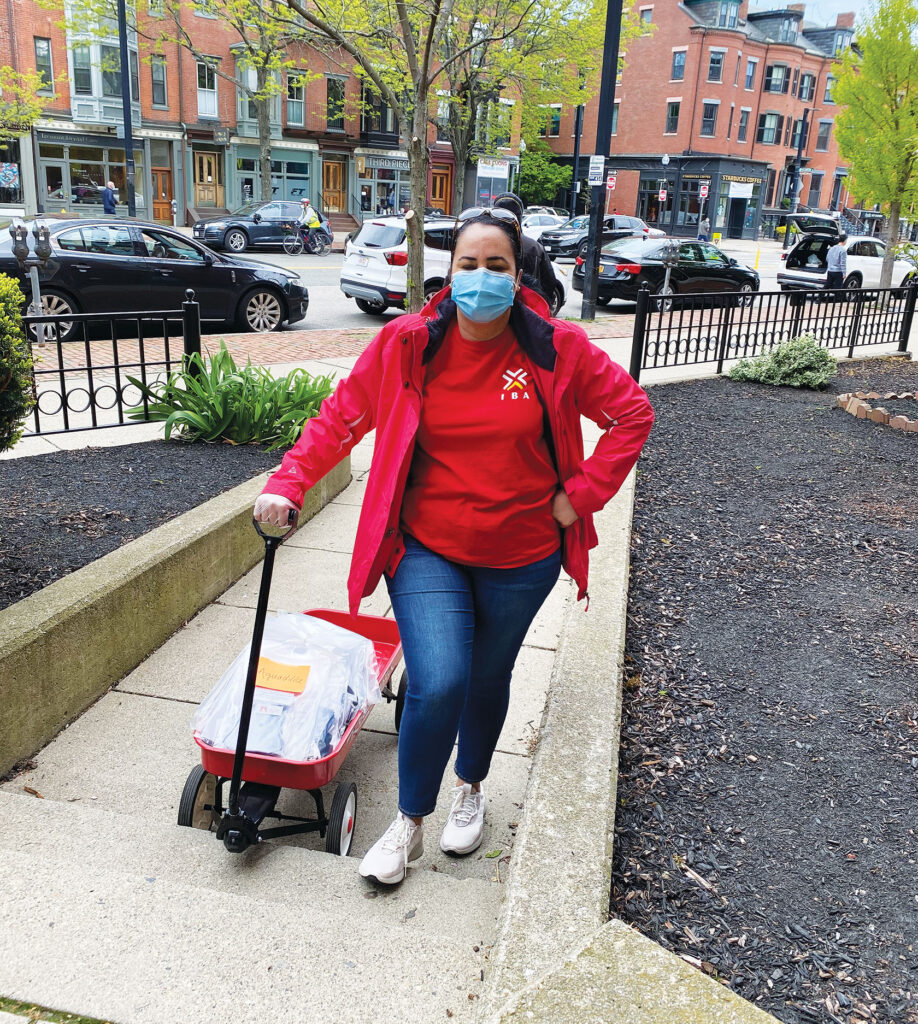New study identifies Puerto Rican COVID issues
Non-English-speaking community needs more outreach in health crises

A new study from the University of Massachusetts Lowell, which surveyed members of the Greater Boston Puerto Rican community at the start of the COVID-19 pandemic and one year in, found that community members who spoke less English in their day-to-day lives were more likely to report testing positive for the virus.
“It was indicative that potentially some of the COVID-19 public health messaging wasn’t reaching Spanish-speaking participants in this example as well as reaching those who are native English speakers,” said Kelsey Mangano, one of the researchers on the study.
The researchers concluded language access and cultural relevancy are important considerations in addressing public health crises.
In the South End, at the Villa Victoria community, a low-income housing community with Puerto Rican roots, efforts to bring language access to messaging during the pandemic went beyond just language and focused on culture too.
Inquilinos Boricuas en Acción (IBA), which manages the community, organized Facebook Live conversations with doctors and epidemiologists from Massachusetts General Hospital and the Boston Public Health Commission to share information about the disease in the early days of the pandemic and again as efforts to vaccinate the community spread.

Community members gather at the Villa Victoria housing complex in the South End
for a musical performance in September 2020. BANNER PHOTO
Those experts were not only Spanish-speakers but often Puerto Rican, which Vanessa Calderón-Rosado, CEO of IBA, said was important to help communicate the message.
“When you see qualified experts who not only speak your language but also share your culture and cultural values, I think that definitely helps in mobilizing people to action,” she said.
The study highlighted the need for culturally aware treatment in public health emergencies. Mangano said it’s important not only to consider language but also how communities interact with each other to best tailor health communications.
“Flyers and TV messaging is still important, and it reaches individuals, but I think what we’re finding through our research and other research is that some communities don’t respond as strongly to individual-based messaging,” Mangano said.

Musicians perform at Villa Victoria in September 2020. A new study from researchers at University of Massachusetts Lowell suggests social connectivity within Boston’s Puerto Rican community helped their resiliency during the pandemic. BANNER PHOTO
That might mean focusing communications from religious organizations, in communities where that is a priority, or focusing on work or exercise communities, she said.
“Reaching communities is also about their cultural habits, their relationships with friends and families, and some communities have stronger social networking than others, and to — for lack of better word — tap into that, it’s really important to spread public health messages in a trusted format,” Mangano said.
Working with community organizations isn’t a strange concept to the Harvard Street Neighborhood Health Center (HSNHC) in Dorchester. During the COVID-19 pandemic, to increase trust in vaccines and treatments, they partnered with organizations like the Somali Development Center, Haitian American Public Health Initiative and Multicultural AIDS Coalition to run workshops and vaccine clinics.
“Really going out into the community to meet them where they’re at is really a great way to overcome that vaccine hesitancy and overcoming language barriers for them because they’re already comfortable in those community organizations,” said Sara Callard, HSNHC’s director of communications and grants.
Bridging language access and cultural gaps was important to helping people access care, she said.
“We just needed to communicate with everybody why it’s needed and why it’s safe [to get vaccinated], to overcome that vaccine hesitancy,” Callard said. “If you can’t speak the language, it’s just that much harder to communicate that.”
Those cultural differences can also provide opportunities. In the study, Mangano and her fellow researchers found that a number of metrics focused on mental health improved as the pandemic
went on.
“To our surprise, we found that reports of feelings of loneliness and depression actually improved. There was less reporting of that symptomology from phase one to phase two,” Mangano said. “Further on in the pandemic, people were feeling less depressed and lonely compared to reports that they had provided before the pandemic.”
Similar results were found in research looking at Puerto Ricans living on the island before and after Hurricane Maria.
At the same time, 32% of respondents in the study reported greater communication with friends and family compared to before the pandemic. Due to the survey design, Mangano couldn’t say with certainty, but she thinks that sense of social connection might have helped the mental health metrics, something that, according to the study, “may be key for future programmatic responses to pandemics to reduce the mental health burden.”
“They’re communicating with their friends and family more, and to me that kind of made sense, then, that their feelings of depression and loneliness would decrease. They have greater social connectedness,” Mangano said.
Calderón-Rosado said she saw that play out in real time with residents at Villa Victoria. Over the course of the pandemic, IBA conducted wellness calls to residents, organized learning pods for kids and conducted socially distant music performances to keep the community engaged with the community and their culture.
“I think all those things really helped in keeping people sane, basically, centered, engaged and really in contact with others,” Calderón-Rosado said.






